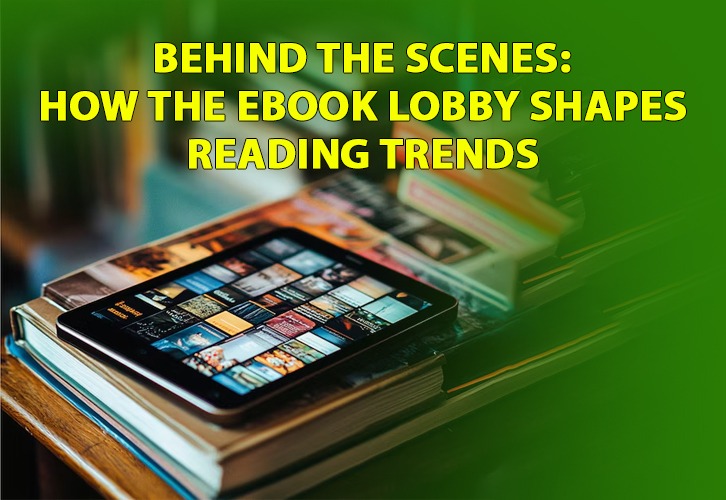Ever wondered why the same ebook costs $14.99 on one platform and $9.99 on another? Or why does your local library has a six-month waiting list for a popular digital title? These aren’t random market quirks. They are the calculated results of a powerful, often invisible force: the ebook lobby.
Behind every digital book you buy or borrow, there’s a complex web of negotiations, high-stakes lobbying, and strategic policy-making. Tech giants, publishing houses, and library associations are in a constant battle to shape the digital world to their advantage. Their fight for profit and control directly impacts the books you can access, the prices you pay, and even whether you truly “own” your digital library.
Let’s pull back the curtain on how this hidden ecosystem works.
Who is Pulling the Strings?
The “ebook lobby” isn’t a single organization but a coalition of powerful interest groups, each with its own agenda. The main players include:
- Publishing Conglomerates: Houses like Penguin Random House and HarperCollins lobby for strong copyright laws and pricing models that protect their profit margins from deep discounting by retailers.
- Tech Giants: Companies like Amazon, Apple, and Google control the major distribution platforms. They lobby for favorable terms, control over their ecosystems, and the data that drives their powerful recommendation algorithms.
- Library Associations: Groups like the American Library Association (ALA) advocate fiercely for fair pricing and less restrictive lending terms, championing the public’s right to information.
- Author Guilds: Organizations representing authors fight for fair royalty rates and contract terms, ensuring creators are compensated justly in the digital age.
These groups spend millions annually influencing state and federal legislation on everything from digital rights management (DRM) to copyright terms, shaping the very foundation of our digital reading experience.
The Agency Model Wars: Why Your Ebooks Cost What They Do
The price of an ebook is the result of a bitter tug-of-war between publishers and retailers. For years, Amazon’s wholesale model allowed it to sell ebooks at a loss to attract customers to its Kindle ecosystem, a practice publishers feared would devalue books permanently.
In response, publishers, led by Apple’s entry into the market, lobbied for the “agency model.” Under this model, the publisher sets the consumer price, and the retailer (like Apple or Amazon) simply takes a commission. This shift gave publishers control but led to a famous antitrust lawsuit filed by the U.S. Department of Justice against Apple and five major publishers for price-fixing.
Today’s pricing is a tense compromise born from these legal battles. When you see price fluctuations or regional differences, you’re not seeing simple market forces; you’re seeing the outcome of years of high-stakes corporate negotiation.
A Digital Dilemma: Why Libraries Pay Exorbitant Prices
Here’s a fact that shocks most readers: public libraries often pay up to five times more for an ebook license than a consumer pays to buy it.
Publishers argue that unlike a physical book that wears out, a digital copy can be loaned out infinitely, potentially cannibalizing retail sales. To “protect their revenue,” they impose restrictive and expensive licensing models on libraries. These agreements often mean:
- Sky-High Prices: A $15 consumer ebook might cost a library $85 for a two-year license.
- Limited Checkouts: Some licenses expire after a set number of loans (e.g., 26 checkouts), forcing the library to repurchase the book.
- Embargoes: Publishers may prevent libraries from acquiring licenses for new bestsellers for several weeks or months after their release. Need more info about ebook licensing? Read this
Library associations are constantly fighting for more equitable terms, but they are often outmatched by the immense resources of publishing lobbyists.
Do You Really Own Your Digital Library? The “License vs. Own” Debate
When you click “Buy Now” on an ebook, you aren’t buying a book. You are buying a license to read a book under terms set by the seller.
This critical legal distinction, successfully lobbied for by publishers, means that unlike a physical book, you typically cannot:
- Resell your ebook.
- Give it to a friend.
- Lend it to a family member.
- Pass it down as part of your inheritance.
Consumer advocacy groups are challenging this, arguing for a “digital first-sale doctrine” that would give owners of digital goods the same rights as owners of physical goods. The debate continues in courts and legislatures worldwide, and its outcome will determine the future of digital ownership.
What Can You, the Reader, Do?
While these forces are large, reader behavior is a powerful counterbalance. Here’s how you can make a difference:
- Support Your Library: Borrow ebooks and audiobooks through apps like Libby. High circulation numbers give libraries more leverage when negotiating with publishers.
- Vote With Your Wallet: Purchase from platforms that offer consumer-friendly policies, such as selling DRM-free ebooks where possible.
- Stay Informed: Follow organizations like the ALA or Electronic Frontier Foundation (EFF) that advocate for reader rights.
- Speak Up: Voice your opinions on social media and to your legislative representatives about unfair pricing and restrictive licensing.
The future of digital reading is still being written. By understanding the forces at play, readers can move from being passive consumers to active participants in the fight for a more open and accessible digital literary world. Have an ebook idea that you plan to bring to life? Let’s talk!

